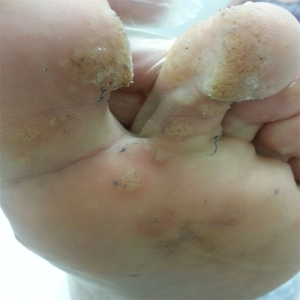A plantar wart is a viral infection that affects the skin. Plantar warts are referred to the lesions that occur on the bottom of the foot or between the toes. Like the common cold virus, anyone can get plantar warts, but they are more contagious to those who have a weaker immune system (children and seniors). Treatment must be started as soon as possible because it’s possible to for plantar warts to multiply and can spread to other people.
Warts are spread through wet environments such as swimming pools, change rooms, gym showers and hotel bathrooms. They occur commonly in the feet because your footwear is the perfect breeding ground for plantar warts. Plantar warts need a dark and moist environment to live and thrive. It is fairly common for people to spread plantar warts to others who are using the same bathroom and shower.
Warts will initially be pain free in the early stages but once callus builds over top of the wart, it can cause pain when walking. Sometimes black dots can be seen within the lesion itself which are capillary vessels.
Difference between warts and corns
Plantar warts are caused by the Human Papillomavirus (HPV). Like a common cold it can spread from person to person through wet environments. Corns on the other hand, are due to uneven pressure applied to the foot. The area of your foot where there is a lot of pressure will cause callus to form and then possibly a corn. Corns are not contagious and will only occur in areas of uneven pressure. Many people mistake one for the other because they present themselves very similarly. Some people may never develop corns, and the incidence of corns is not related to the number of people around you that have corns. However, you chances of getting plantar warts increase if you live in a household where someone else has a wart. If you suspect you have a wart or a corn, it is best to see a foot specialist right away so treatment can be initiated.
How can you prevent warts?
If you are using a public swimming pool, washroom or change room, be sure to use flip flops or sandals to minimize your chance of infection. Warts only survive in moist dark environments so it would be a good idea to not be bare foot in high traffic areas where there is standing water. If your feet sweat and if you spend long periods of time in shoes, changing your socks and using foot powders to keep your feet dry will prevent the plantar warts from spreading.
How we treat your Plantar Warts
There are a wide variety of ways to treat plantar warts. We have treatments that are pain free to very aggressive treatments which may cause some discomfort. The length of time you had the wart will give us an idea of how many treatments will be needed and the strength of treatment needed. On your initial visit we will also educate you on how to prevent the virus from spreading to other areas of your foot and to members of your family. It is very important for you to come in to get your feet treated for plantar warts as soon as possible to prevent spreading of the infection.
Please feel free to book your appointment at our Whitby office, or Toronto Office. Now serving- Bowmanville, Courtice, Oshawa, Whitby, Brooklin, Ajax, Durham, Pickering, Scarborough, Toronto, Etobicoke, Mississauga, Richmond Hill, Markham, Thornhill.

